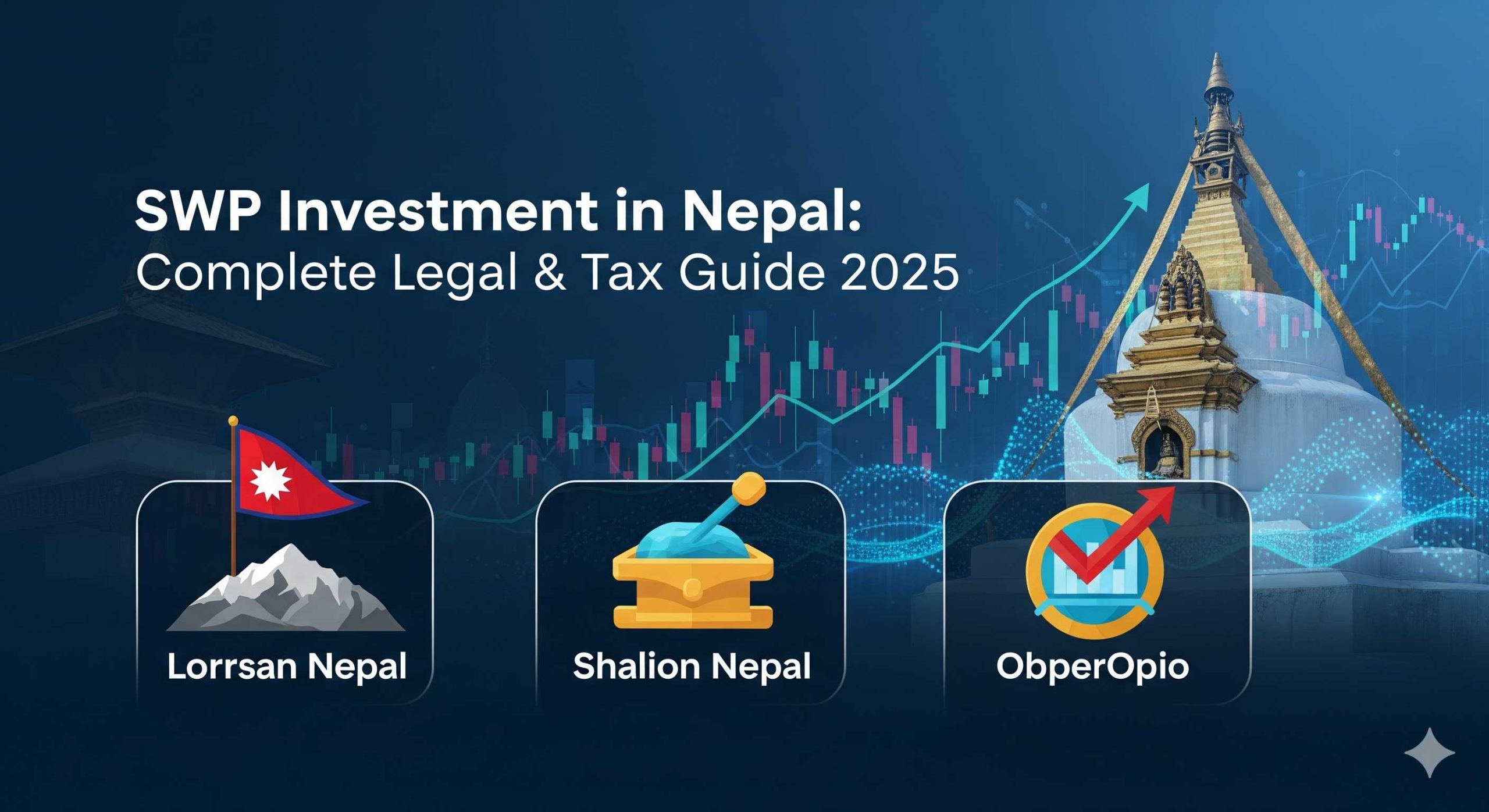Table of Contents
Introduction
SWP Investment in Nepal represents a strategic financial approach gaining significant traction among sophisticated investors. Furthermore, systematic withdrawal plans offer structured income streams while maintaining investment growth potential. Additionally, Nepal’s evolving regulatory framework has created new opportunities for both domestic and international investors seeking reliable financial instruments.
What is SWP investment?
Systematic Withdrawal Plans (SWPs) allow investors to withdraw predetermined amounts from their mutual fund investments at regular intervals. Consequently, this approach provides steady income while preserving capital appreciation opportunities.
What is SWP Investment in Nepal?
SWP Investment in Nepal operates under the Securities Board of Nepal (SEBON) regulations. Moreover, these investment vehicles combine the benefits of mutual funds with systematic income generation capabilities. Additionally, investors can customize withdrawal frequencies according to their financial needs.
The Nepal Rastra Bank has established clear guidelines for financial institutions offering systematic withdrawal services. Therefore, investors benefit from regulatory protection while accessing flexible investment solutions. Furthermore, SWP Investment in Nepal aligns with the country’s broader financial inclusion objectives.
Key Features of SWP Investments
| Feature | Description | Benefit |
|---|---|---|
| Systematic Withdrawals | Regular income payments | Predictable cash flow |
| Capital Preservation | Principal amount protection | Long-term wealth building |
| Tax Efficiency | Optimized tax treatment | Higher net returns |
| Flexibility | Customizable withdrawal amounts | Personalized financial planning |
Legal Framework Governing SWP Investment in Nepal
Nepal’s legal infrastructure for SWP Investment in Nepal operates under multiple regulatory bodies. Additionally, the Securities Act 2063 provides foundational legal framework for investment products. Moreover, recent amendments have strengthened investor protection mechanisms.
The Nepal Rastra Bank’s directives specifically address systematic withdrawal plans offered by licensed financial institutions. Consequently, investors enjoy enhanced legal protections and standardized service delivery. Furthermore, these regulations ensure transparency in fee structures and investment disclosures.
Regulatory Compliance Requirements
Financial institutions offering SWP Investment in Nepal must maintain:
- Minimum capital adequacy ratios as prescribed by NRB
- Regular compliance reporting to SEBON
- Transparent fee disclosure mechanisms
- Investor grievance redressal systems
How Does SWP Investment Compare to Mutual Funds in Nepal?
SWP Investment in Nepal differs significantly from traditional mutual fund investments. Additionally, while mutual funds focus on capital appreciation, SWPs prioritize income generation alongside growth. Moreover, the systematic withdrawal feature distinguishes SWPs from conventional investment approaches.
| Aspect | SWP Investment | Traditional Mutual Funds |
|---|---|---|
| Income Generation | Regular systematic withdrawals | Dividend-based income |
| Capital Access | Scheduled partial redemptions | Full redemption required |
| Investment Horizon | Long-term with income needs | Pure capital appreciation |
| Risk Management | Diversified with income stability | Market-dependent returns |
Traditional mutual funds in Nepal have shown average annual returns of 12-15% over the past decade. However, SWP Investment in Nepal provides both growth potential and regular income streams, making it attractive for retirement planning.
Tax Implications of SWP Investment in Nepal
Understanding tax implications remains crucial for SWP Investment in Nepal participants. Additionally, the Income Tax Act 2058 provides specific provisions for investment income taxation. Moreover, systematic withdrawals may qualify for preferential tax treatment under certain conditions.
Tax Benefits and Considerations
- Capital gains tax exemptions for long-term holdings
- Systematic withdrawal income treated as capital gains
- Potential tax deferrals through reinvestment strategies
- Professional tax planning opportunities for high-net-worth individuals
The Nepal government has introduced tax incentives encouraging long-term investments. Consequently, SWP Investment in Nepal can provide significant tax advantages compared to traditional savings instruments.
Where Can I Invest in SWP in Nepal?
Several licensed financial institutions offer SWP Investment in Nepal services. Additionally, major commercial banks have developed comprehensive SWP products tailored to Nepali investors’ needs. Moreover, investment companies regulated by SEBON provide specialized systematic withdrawal plan options.
Authorized SWP Providers
- Commercial Banks: Most major banks offer SWP services through their investment divisions
- Investment Companies: Licensed fund managers provide specialized SWP products
- Insurance Companies: Life insurance firms offer SWP-linked investment solutions
- Asset Management Companies: Professional fund managers with SEBON licenses
Before selecting a provider, investors should evaluate fees, track records, and regulatory compliance. Furthermore, SWP Investment in Nepal success depends significantly on choosing reputable service providers.
Investment Strategies for SWP in Nepal
Successful SWP Investment in Nepal requires strategic planning and professional guidance. Additionally, diversification across asset classes enhances portfolio stability while maintaining income generation capabilities. Moreover, regular portfolio rebalancing ensures optimal risk-return profiles.
Strategic Considerations
- Asset Allocation: Balance between equity and fixed-income investments
- Withdrawal Rate: Sustainable income levels based on portfolio size
- Market Timing: Strategic entry points for maximum benefit
- Risk Management: Downside protection through diversification
Professional financial advisors specializing in SWP Investment in Nepal can provide personalized strategies based on individual circumstances and objectives.
Risks and Mitigation Strategies
Like all investment vehicles, SWP Investment in Nepal carries inherent risks requiring careful management. Additionally, market volatility can impact both portfolio values and withdrawal sustainability. Moreover, regulatory changes may affect investment terms and conditions.
Primary Risk Factors
| Risk Type | Description | Mitigation Strategy |
|---|---|---|
| Market Risk | Portfolio value fluctuations | Diversified asset allocation |
| Liquidity Risk | Withdrawal timing challenges | Adequate cash reserves |
| Regulatory Risk | Policy changes impact | Stay informed about regulations |
| Inflation Risk | Purchasing power erosion | Inflation-protected investments |
Professional risk assessment helps optimize SWP Investment in Nepal outcomes while protecting investor interests.
Also Read
- FDI Process in Nepal
- Company Registration in Nepal
- Shram Swikriti Nepal
- Education Consultancy Registration in Nepal
- Divorce Process in Nepal
- Marriage Registration in Nepal
- Branch Office registration in Nepal
- Joint venture Agreement in Nepal
- Travel Agency Registration in Nepal
- Import Export License in Nepal
- Manpower Company Registration in Nepal
Future Outlook for SWP Investment in Nepal
The future of SWP Investment in Nepal appears promising given increasing financial literacy and regulatory support. Additionally, demographic trends toward retirement planning create growing demand for systematic withdrawal solutions. Moreover, technological advancements are making SWP investments more accessible to retail investors.
Market analysts project significant growth in systematic withdrawal plan adoption over the next five years. Consequently, SWP Investment in Nepal will likely become a mainstream financial planning tool for sophisticated investors.
Conclusion
SWP Investment in Nepal represents a sophisticated financial instrument combining growth potential with systematic income generation. Additionally, the regulatory framework provides adequate investor protection while promoting market development. Moreover, tax benefits and investment flexibility make SWPs attractive for long-term financial planning.
Investors considering systematic withdrawal plans should conduct thorough due diligence and seek professional advice. Furthermore, understanding legal requirements and tax implications ensures optimal investment outcomes. Ultimately, SWP Investment in Nepal offers valuable opportunities for building sustainable wealth while generating regular income streams.
Disclaimer: This content is for informational purposes only and does not constitute financial advice. Investors should consult qualified financial advisors before making investment decisions. Market conditions and regulations may change, affecting investment outcomes.
Related posts:
- https://lawaxion.com/criteria-for-five-star-hotel-in-nepal/
- https://lawaxion.com/manpower-license-process-in-nepal/
- https://taxconsultantnepal.com/non-profit-organization-registration-process-in-nepal/
- https://taxconsultantnepal.com/nrn-citizenship-process-in-nepal-2025-2/
- https://taxconsultantnepal.com/export-import-license-process-in-nepal/
- https://lawaxion.com/foreign-direct-investment-approval-process-in-nepal/
- https://companynp.com/trademark-registration-process-in-nepal/
- https://taxconsultantnepal.com/company-registration-process-in-nepal/
- https://lawaxion.com/non-resident-nepali-nrn-id-card-in-nepal/
- https://companynp.com/travel-and-tours-company-registration-in-nepal/
- https://lawaxion.com/education-consultancy-license-process-in-nepal/
- https://taxconsultantnepal.com/branch-office-registration-in-nepal-contact-liaison-office/




